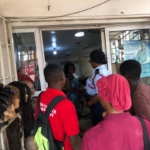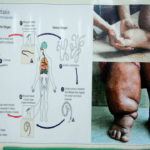
Ridge Hospital is supposed to be a place of healing, but last week it became a theatre of shame. Ralph St. Williams stormed the emergency ward, shouting, filming, flanked by men who had no business in a space of pain. A young nurse, already stretched by too many patients and too few hands, was left in tears with a dislocated shoulder and her phone snatched. Patients, sick and afraid, watched the chaos unfold. This is not how a hospital should feel.
But Ghana has a way of turning private tragedy into public theatre. Soon, the Ghana Registered Nurses and Midwives Association (GRNMA), led by its fiery General Secretary, Dr. David Tenkorang Twum, was on the airwaves calling Ralph a thug, issuing ultimatums, and warning that Ridge’s emergency unit could be shut down. He was defending his own, yes, but his voice echoed louder than the patient’s, louder than the citizen’s.
The nurse’s pain is real, and so too is the everyday suffering of patients who walk into public hospitals only to meet indifference, insults, or silence from the very professionals meant to care for them. That hypocrisy cuts deepest. Ask any Ghanaian who has stood in the corridors of a public hospital: the sharp words, the rolled eyes, the scolding that makes the sick feel like beggars. Yet in a private hospital, the same nurse becomes an angel with a gentle voice, a reassuring smile, and patience in abundance. Why? Because in private care, governance works. Supervision is strict, pay is better, and accountability is real.
Then came the Minister of Health, Kwabena Mintah Akandoh. When the cameras captured him shaking hands with Ralph the next day, it felt like betrayal. How can a Minister who represents every nurse, every patient, and every grieving family be seen embracing the man accused of assault? The Ministry’s Public Relations Officer, Tony Goodman, later explained that the handshake was fleeting and should not overshadow the Minister’s directives: calling in the police, ordering better security, and addressing staffing shortages. Fair enough. But perception matters, and in that moment, the Minister did not do well. Leadership is not only about what you do. It is also about the signals you send.
Parliament, to its credit, found the right words. The Minority members on the Health Committee condemned Ralph’s conduct as reckless and called for swift police action. Their tone was measured and appropriate. But citizens cannot help but notice. Parliament roars when cameras are rolling, then grows quiet when patients die from neglect in Koforidua, Tamale, or Sunyani. Respectfully, the House must rise above episodic outrage and move toward oversight that makes negligence costly, not routine.
And the Police? They moved in, made arrests, released CCTV footage, and began taking statements. That is the duty of law enforcement, and on this occasion, they did not sit idle. Yet for many citizens, trust is fragile. Too often cases that begin with urgency fade into silence, with follow-up weak or inconsistent. Ghanaians want this one to be different—not just arrests, but justice carried through to the end.
Here is where the GRNMA loses the moral high ground. Their response to one man’s recklessness was to threaten abandoning their posts. That is no remedy; it is dangerous. A responsible union should not hold patients hostage. If anything, they should demand that justice be carried out and allow the Police to do their work. That is how a professional body strengthens its credibility.
Imagine if police officers, frustrated by public criticism, dropped their weapons and abandoned the streets. Or if firemen, tired of insults, let flames consume homes just to make a point. Society would collapse in hours. Responsibility does not vanish because the job is hard.
The real fight is not in walking away from wards, but in ensuring that the rule of law is respected and that hospitals deliver the dignity and care Ghanaians deserve.
Think of the patient who died because a nurse brushed off her cries as “exaggeration.” Think of the mother who lost her baby because the midwife was “on break.” Think of the accident victim who bled to death in a public emergency unit while nurses scrolled their phones. These are not rumours. They are the stories that fill our trotro conversations, our radio lines, our funerals. These are the silent Ralph incidents that never make headlines.
So yes, Ralph must face the law. Yes, the GRNMA must protect its members. Yes, the Minister must be sharper with optics. And yes, Parliament must legislate. But until governance changes, until nurses in public hospitals are held to the same standard as in private ones, until citizens feel safe, respected, and cared for, nothing changes. We will jail Ralph, explain away a handshake, and praise Parliament’s condemnation, but tomorrow another patient will die from neglect. And that death will not trend.
The scandal is not just Ralph at Ridge. The scandal is the health system that allows a nurse to be a tyrant in public and an angel in private. The scandal is governance that protects impunity but punishes compassion. The scandal is a nation that mourns only when the cameras are on.
We must end this scandal. Not with ultimatums, not with handshakes, not with speeches. But with governance that finally values the Ghanaian life as more than a statistic, more than a vote, more than a number on a hospital bed. Until then, every Ghanaian who walks into a public hospital will carry the same fear: will I be saved or scolded before I take my last breath?



